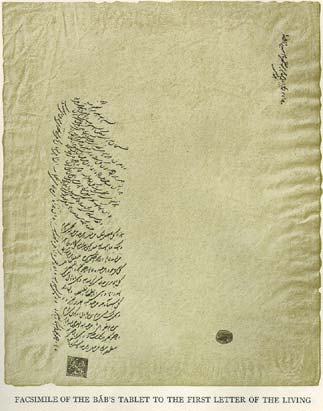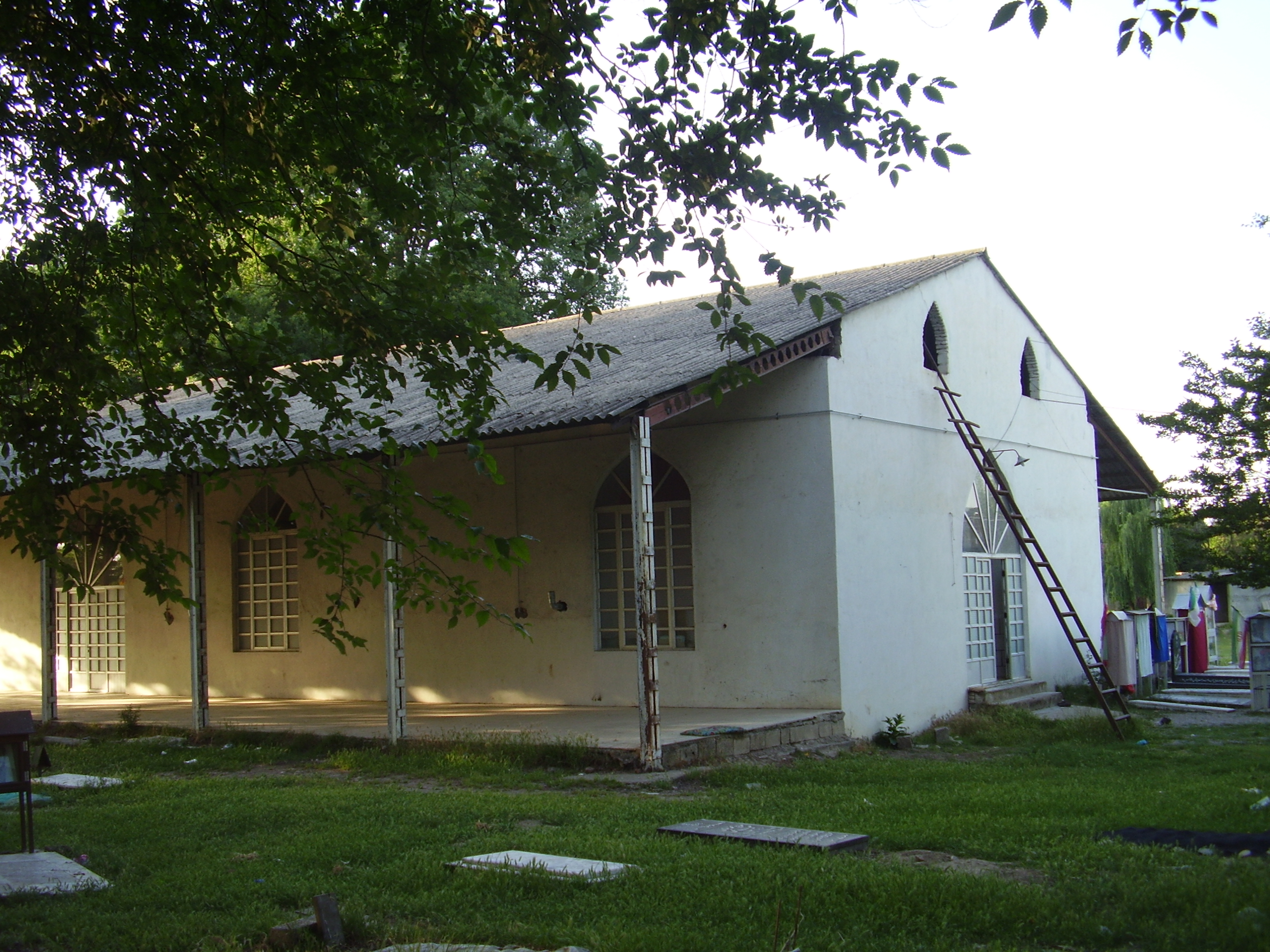|
Mullá ʻAlíy-i-Bastámí
Mullá ʻAlí-i-Bastámí (died 1846) was the second Letter of the Living in the Bábí movement. He is also probably the first and one of the best known martyrs of the early Bábí period. Biography Early life He was born near the small city of Bastam in northwestern Persia during the reign of the Qajar dynasty. He married in his youth and had at least one child. As a young man he gained a reputation for his interest in religion, and studied as a Mullah in the shrine city of Mashhad. In Mashhad he became familiar with local clerics who were associated with the millenarian Shaykhí denomination of Shia Islam and was attracted to Shaykhí doctrine. Eventually he moved to Karbala in the Ottoman Empire, and studied under Siyyid Kazim Rashti, then the leader of Shaykhism, for at least seven years. Conversion to Bábism Shaykhís expected the imminent arrival of the Qa'im or Mahdi, and after the death of Siyyid Kazim in January 1844, Bastámí led a group of Shaykhís who, ... [...More Info...] [...Related Items...] OR: [Wikipedia] [Google] [Baidu] |
Letters Of The Living
The Letters of the Living () was a title provided by the Báb to the first eighteen disciples of the Bábí Religion. In some understandings the Báb places himself at the head of this list (as the first letter). In this article, the former notation will be used except when specifically said otherwise. Mystical meaning The Báb named the first eighteen believers in his mission as the ''Letters of the Living'' (''Ḥurúfu'l-ḥayy'' in Arabic). One of the Báb's titles was the "Primal Point" (''nuqti-yi-úlá''). As Baháʼí scholar Moojan Momen explains: The Eighteen 'Letters of the Living' manifested themselves in the last, i.e. the Muhammadan Manifestation in the persons of the Fourteen Holy Souls (i.e. the Prophet himself, his daughter Fatima, and the Twelve Imams of whom the first, 'Ali, was her husband, and the remainder of her descendants) and the Four Gates (or Bábs) who successively acted as channels of communication between the Twelfth Imam, or Imam Mahdi, ... [...More Info...] [...Related Items...] OR: [Wikipedia] [Google] [Baidu] |
Báb
The Báb (born ʻAlí-Muḥammad; ; ; 20 October 1819 – 9 July 1850) was an Iran Iran, officially the Islamic Republic of Iran (IRI) and also known as Persia, is a country in West Asia. It borders Iraq to the west, Turkey, Azerbaijan, and Armenia to the northwest, the Caspian Sea to the north, Turkmenistan to the nort ...ian religious leader who founded Bábism, and is also one of the central figures of the Baháʼí Faith. The Báb gradually and progressively revealed his claim in his extensive writings to be a Manifestation of God (Baháʼí Faith), Manifestation of God, of a status as great as Moses, Jesus, and Muhammad, receiving revelations as profound as the Torah, Gospel, and Quran. This new revelation, he claimed, would release the creative energies and capacities necessary for the establishment of global unity and peace. He referred to himself by the traditional Muslim title "Báb" (meaning the gate) although it was apparent from the context that he intend ... [...More Info...] [...Related Items...] OR: [Wikipedia] [Google] [Baidu] |
Iranian People Who Died In Prison Custody
Iranian () may refer to: * Something of, from, or related to Iran ** Iranian diaspora, Iranians living outside Iran ** Iranian architecture, architecture of Iran and parts of the rest of West Asia ** Iranian cuisine, cooking traditions and practices Other uses * Iranian peoples, the speakers of the Iranian languages. The term Iranic peoples is also used for this term to distinguish the pan-ethnic term from Iranian, used for the people of Iran * Iranian languages, a branch of the Indo-Iranian languages * Iranian.com, also known as ''The Iranian'' and ''The Iranian Times'' See also * Persian (other) * Iranians (other) * Languages of Iran * Ethnicities in Iran * Demographics of Iran * Indo-Iranian languages * Irani (other) * List of Iranians This is an alphabetic list of notable people from Iran or its historical predecessors. In the news * Ali Khamenei, supreme leader of Iran * Ebrahim Raisi, former president of Iran, former Chief Justice of Iran. ... [...More Info...] [...Related Items...] OR: [Wikipedia] [Google] [Baidu] |
Ziyarat
''Ziyara(h)'' ( ''ziyārah'', "visit") or ''ziyarat'' (, ''ziyārat'', "pilgrimage"; , "visit") is a form of pilgrimage to sites associated with the Islamic prophet Muhammad, his family members and descendants (including the Shī'ī Imāms), his companions and other venerated figures in Islam such as the prophets, Sufi auliya, and Islamic scholars. Sites of pilgrimage include mosques, maqams, battlefields, mountains, and caves. ''Ziyārat'' can also refer to a form of supplication made by the Shia, in which they send salutations and greetings to Muhammad and his family. Terminology ''Ziyarat'' comes from "to visit". In Islam it refers to pious visitation, pilgrimage to a holy place, tomb or shrine.Gibb, H. A. R.; Kramers, J. H.; Lévi-Provençal, E.; Schacht, J.; Lewis, B.; Pellat, Ch., eds. (1960). ''The Encyclopaedia of Islam, New Edition'', Volume I: W–Z. Leiden: E. J. Brill. pp. 524, 533–39. . Iranian and South Asian Muslims use the word ''ziyarat'' for both t ... [...More Info...] [...Related Items...] OR: [Wikipedia] [Google] [Baidu] |
Muhammad Hasan Al-Najafi
Grand Ayatollah Sheikh Muhammad-Hasan al-Najafi (; 1785–1850), also known as Sahib al-Jawahir (Arabic: ), was a prominent Shiite religious authority and author. He was most known for his books of ''Jawahir al-Kalam Fi Sharh Shara'i' al-Islam'', a 42-volume work on fiqh''.'' Birth Though the exact date of Muhammad Hasan's birth is unclear, Agha Bozorg Tehrani, a renowned Shi'ite scholar from Iran, puts it at around 1212 lunar Hijri (AD 1797). His father, Shaykh Muhammad Baqir al-Najafi, along with his wife and Shaykh Muhammad Hassan's mother, were the grandchildren of Shaykh Abu Al-Hassan Al-Futuni Al-Amili, who is from Jabal Amil, Lebanon. His family lineage includes numerous religious scholars and his brother, Muhammad Hossein, who was killed as a young man. Muhammad Hasan had eight sons, and several daughters. Usuli movement and Najaf seminary The appearance of Muhammad Hasan was the result of a development in which some important persons contributed. The Najaf seminary was ... [...More Info...] [...Related Items...] OR: [Wikipedia] [Google] [Baidu] |
Ijtihad
''Ijtihad'' ( ; ' , ) is an Islamic legal term referring to independent reasoning by an expert in Islamic law, or the thorough exertion of a jurist's mental faculty in finding a solution to a legal question. It is contrasted with '' taqlid'' (imitation, conformity to legal precedent). According to classical Sunni theory, ''ijtihad'' requires expertise in the Arabic language, theology, revealed texts, and principles of jurisprudence ('' usul al-fiqh''), and is not employed where authentic and authoritative texts (Qur'an and hadith) are considered unambiguous with regard to the question, or where there is an existing scholarly consensus ('' ijma''). ''Ijtihad'' is considered to be a religious duty for those qualified to perform it. An Islamic scholar who is qualified to perform ''ijtihad'' is called a "'' mujtahid''". For first five centuries of Islam, the practice of ''ijtihad'' continued in theory and practice among Sunni Muslims. It then first became subject to dispute in the ... [...More Info...] [...Related Items...] OR: [Wikipedia] [Google] [Baidu] |
Najaf
Najaf is the capital city of the Najaf Governorate in central Iraq, about 160 km (99 mi) south of Baghdad. Its estimated population in 2024 is about 1.41 million people. It is widely considered amongst the holiest cities of Shia Islam and one of its spiritual capitals, as well as the center of Shia political power in Iraq. It is the Imam Ali Shrine, burial place of Muhammad's son in law and cousin, ‘Alī ibn Abī Tālib, and thus a major pilgrimage destination for Shia Muslims. The largest cemetery in the world (Wadi-us-Salaam) and the oldest Shi'a Islamic seminary in the world (Hawza Najaf, Hawza of Najaf) are located in Najaf. Etymology According to Ibn Manzur, the word, "najaf" (), literally means a high and rectangular place around which water is accumulated, although the water does not go above its level. Al-Shaykh al-Saduq appeals to a hadith from Ja'far al-Sadiq, claiming that "Najaf" comes from the phrase, "nay jaff" which means "the nay sea has dried". "Naj ... [...More Info...] [...Related Items...] OR: [Wikipedia] [Google] [Baidu] |
Shiʻa
Shia Islam is the second-largest branch of Islam. It holds that Muhammad designated Ali ibn Abi Talib () as both his political successor (caliph) and as the spiritual leader of the Muslim community (imam). However, his right is understood to have been usurped by a number of Muhammad's companions at the meeting of Saqifa where they appointed Abu Bakr () as caliph instead. As such, Sunni Muslims believe Abu Bakr, Umar (), Uthman () and Ali to be ' rightly-guided caliphs' whereas Shia Muslims only regard Ali as the legitimate successor. Shia Muslims assert imamate continued through Ali's sons Hasan and Husayn, after whom different Shia branches have their own imams. They revere the , the family of Muhammad, maintaining that they possess divine knowledge. Shia holy sites include the shrine of Ali in Najaf, the shrine of Husayn in Karbala and other mausoleums of the . Later events such as Husayn's martyrdom in the Battle of Karbala (680 CE) further influenced the developmen ... [...More Info...] [...Related Items...] OR: [Wikipedia] [Google] [Baidu] |
Tablet (religious)
A tablet, in a religious context, is a term used for certain religious texts. In the Hebrew Bible Judaism and Christianity maintain that Moses brought the Ten Commandments down from Mount Sinai in the form of two tablets of stone. According to the Book of Exodus, God delivered the tablets twice, the first set having been smashed by Moses in his anger at the idol worship of the Israelites. In Islam The Preserved Tablet (''al-Lawhu 'l-Mahfuz''), the heavenly preserved record of all that has happened and will happen, contains '' qadar''. ''Qadar'' (, transliterated ''qadar'', meaning "fate", "divine fore-ordainment", "predestination")J. M. Cowan (ed.) (1976). ''The Hans Wehr Dictionary of Modern Written Arabic''. Wiesbaden, Germany: Spoken Language Services. is the concept of divine destiny in Islam. In the Baháʼí Faith The term "tablet" is part of the title of many shorter works of Baháʼu'lláh, founder of the Baháʼí Faith, and his son and successor ʻAbdu'l-Bahá. S ... [...More Info...] [...Related Items...] OR: [Wikipedia] [Google] [Baidu] |
Bábism
Bábism () is a Messianism, messianic movement founded in 1844 by Báb, the Báb ( 'Ali Muhammad). The Báb, an Iranian merchant-turned-prophet, professed that there is one incorporeal, unknown, and incomprehensible GodEdward Granville Browne, Browne, E.G.]''Kitab-i-Nuqtatu'l-Kaf'' p. 15 who manifests His will in an unending series of Theophany, theophanies, called Manifestation of God (Baháʼí Faith), Manifestations of God. The Báb's ministry, throughout which there was much evolution as he progressively outlined his teachings, was turbulent and short-lived and ended with his public execution in Tabriz in 1850. A campaign of extermination followed, in which thousands of followers were killed in what has been described as potentially one of the bloodiest actions of the Qajar Iranian military in the 19th century. According to current estimates, Bábism has no more than a few thousand adherents, most of whom are concentrated in Iran, but it has persisted into the modern era i ... [...More Info...] [...Related Items...] OR: [Wikipedia] [Google] [Baidu] |





